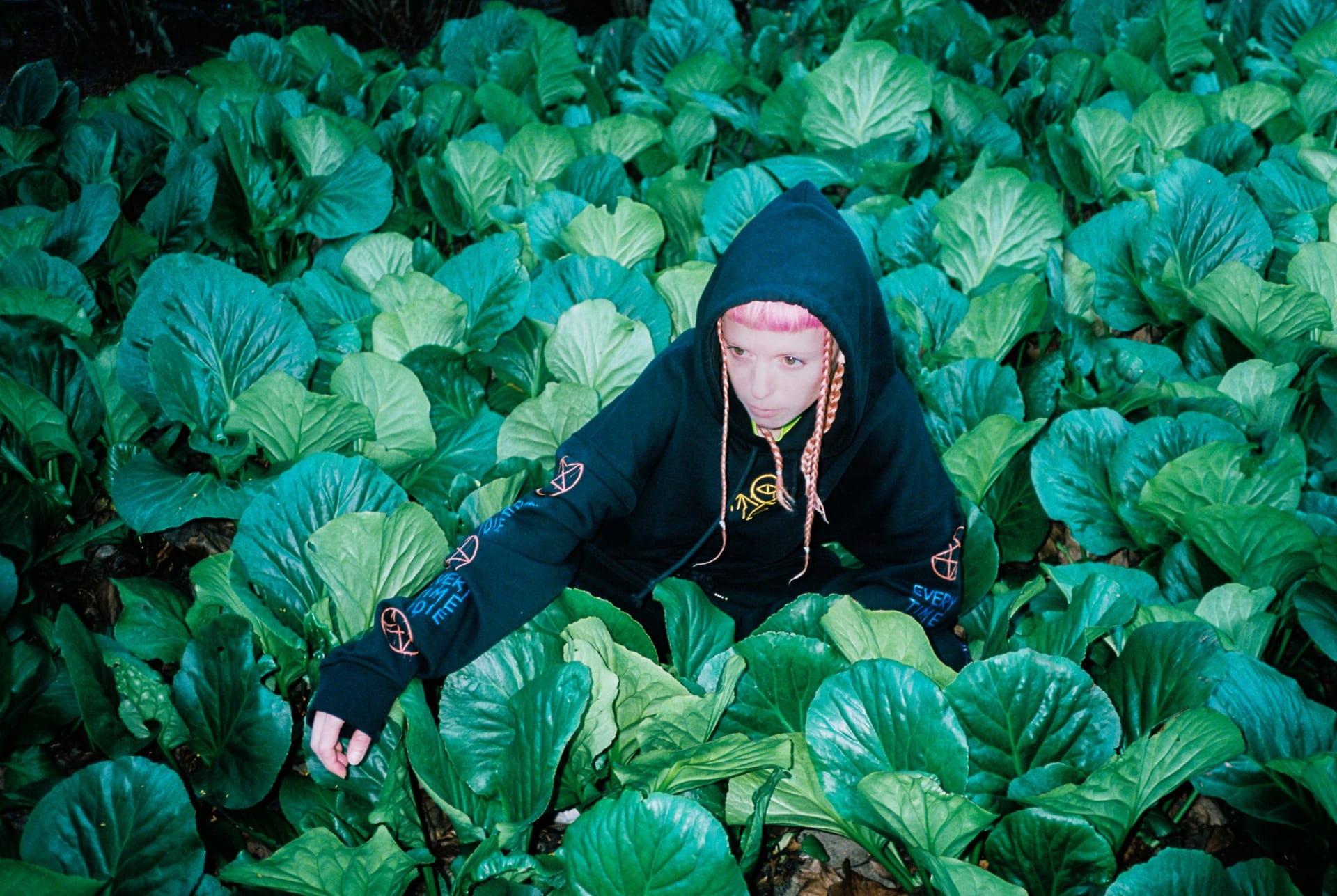
Catnapp’s New EP Will Reunite You With Your Teenage Angst
The Argentinian artist shares how her patchwork approach to music and offbeat sense of style are rooted in her hometown's "trash punk" scene.
Listening to even just the first few minutes of Catnapp’s new EP, Damage, which is out now on Monkeytown Records, it’s not hard to imagine how the Berlin-based producer’s careening sound developed from a youth spent listening to what she describes “alternative trash punk rock” in crowded, sweaty basements in her hometown of Buenos Aires, Argentina. Not even a minute into the EP’s first song and title track, a blown-out blast rings out and a whirlwind of breaks rush in so aggressively that it almost gives your brain whiplash. The album cover offers up a visual interpretation of this exact sensation: the album name is rendered in purple 3D letters while a stream of bright green liquid pours out of Catnapp’s eyes and swirls around her head. Her hot pink hair is styled in mini-braids, one of which almost looks like it’s going to swing out of frame and whack you across the face.
Over the past ten years, Catnapp (aka Amparo Battaglia) has pulled from her varied musical palette to craft songs that bridge the gap between Berlin’s distorted electronic underground and the alternative Argentinian scene that nurtured her creative energy when she was young. She melds this early interest in punk with drum ’n’ bass, big beat, rap, and straight-up pop music to create uncanny music that simultaneously sounds futuristic and nostalgic. To give you the full range of her musical interests, last year she even released her own delightfully deranged take on Limp Bizkit’s “Full Nelson”—under Catnapp’s guidance, the song transforms into a 180 BPM hardcore track that, with some magical thinking, you could imagine blaring out of a massive soundsystem at gabber raves in Rotterdam in the ‘90s.
With Damage, Catnapp’s fine-tuned her ability to craft narratives in her songwriting and carved out a visual world that complements the project’s themes of self-destruction. “I’m really focusing on telling a story with the album this time and bringing the people into a world, into this world of the Damage.” Battaglia’s sonic sensibilities have also sharpened since she released Break, her debut album that came out on Monkeytown last year, and she’s breaking new ground with the visual side of her project—she’s been working with the same creative team on the album cover, upcoming videos, and visuals that she’ll be performing in front of onstage, and she’s working with a stylist on her tour wardrobe. “For the first time in my life, I’m going to have two outfits to perform live in,” she says. “We got some really special pants from the U.S.—they’re these huge cargo pants. I don’t even know what genre of music they’re connected to. It’s like electronic goth.”
In her Sound and Style interview, Battaglia shares her patchwork approach to sound, how her sense of style is rooted in the local alternative scene she found as a teenager, and why she hasn’t stopped listening to Linkin Park (unlike most of her friends).
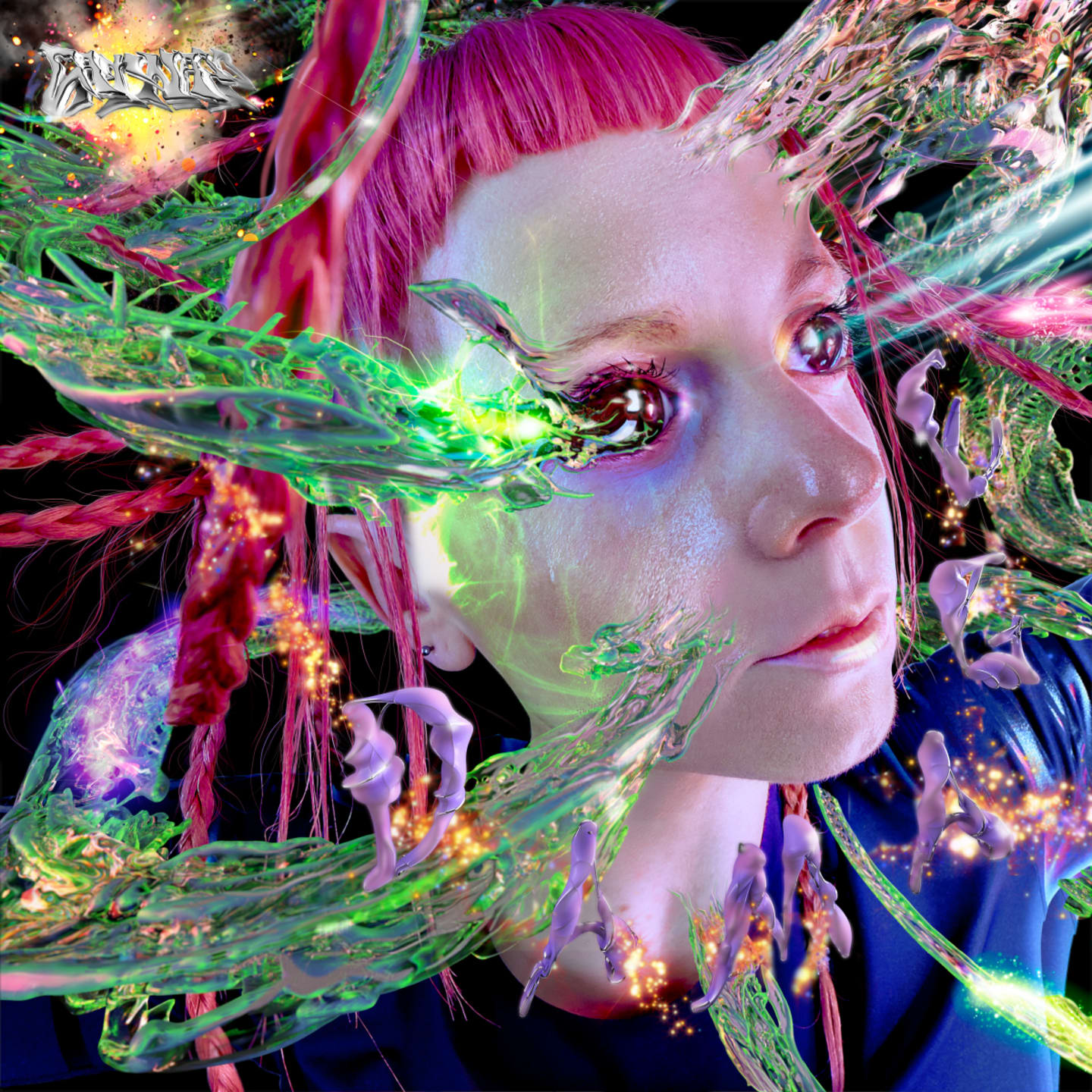
Can you talk me through some of the themes on the new album?
The full EP talks about self-destruction and the need that we have for that. As humans, we seek destruction in so many ways. We also seek to be healthy and we also try to do what’s best for us, but at the same time, we do a lot of stuff that is very bad for us that makes us happy, from going to a party and getting fucked up, to smoking or drinking, or just having a toxic relationship. As a species, I feel that those two things are in our nature: the need to survive and the need to destroy ourselves. We’re destroying the planet. We are not really working very well as a community. We’re the same species and we’re still fighting each other, even inside of friends groups. If you look at small groups of people through a microscope, you will still see fights inside even the closest groups. So the EP talks a bit about all that and that need.
Do you have a visual world laid out already for this EP?
Yeah, and I’m very happy about this. It’s the first time that I’m working with a nice group of people that really get my vision. Of course, I’ve also worked with a lot of people in the past that also shared something with me, but never in this way. Now, I’m doing the video, the cover artwork, the visuals for the show, everything with the same people and telling a story through that and keeping the same aesthetics. I’m really focusing on bringing people into a world, into this world of Damage.
I’ve never seen you perform on stage, but I was watching some videos and that seems to be a very vital medium for you. How do you think about what you’re going to wear on stage and whatever visuals you have to accompany your performances? Is there a persona that you’re kind of extracting or does it represent what you would wear in real life as well?
I’m just myself. I wear what I’m comfortable with. Some days I care more and some days I care less, but usually I’ll wear the same thing onstage that I’ll wear in real life. For my upcoming shows and the upcoming videos I worked with a stylist who is also working with me as my DJ in my performance, DJ MAAY, and we created something together special to go with the aesthetic of the album. She made a special T-shirt for me with a drawing from her that is almost like the Damage logo in a way. And we got some really cute pants from the US from this amazing shop called Trash Liars. They make these huge, huge cargo pants. I don’t even know what you’d call the genre of music associated with them. It’s like electronic goth. They’re amazing. So I’ve got some of those pants and for the first time in my life, I’m going to have two outfits to perform live in. But it’s not really a huge difference between what I wear on the streets. Onstage, I allow myself to unleash the fury. I’m a very chill person and quiet and reserved offstage, but when I perform I’m letting go of all the anxiety and stress I have inside.


How long did it take for you to develop this aesthetic? Did you dress like this when you were a teenager?
I’ve always loved big clothes. I’ve always liked wearing oversize things. I never really felt comfortable showing my body so much, and I always loved just being inside huge clothes, like how pajamas feel. When I was 16, I started to become more goth and alternative and wear weird stuff. In Argentina at that time, there was this whole wave called alternative, and it was this clothing style of music and style—everything together. The clothing style was kind of emo, goth, colorful, but dark at the same time. And then I think I started developing a stronger taste for clothes, even though what I was wearing didn’t look amazing.
Did you have a group of friends who also started to dress like that at that time?
I had a few friends who were also like that, but not too many. I was quite a lonely teenager. I didn’t really have a lot of friends at school because I was the only one kind of dressing like this. I always felt a bit, excluded or rejected, even a bit bullied by them. I had a few friends, but they didn’t necessarily share my style.
Did this new style reflect the music that you were listening to at the time?
Yeah, for sure. I was listening to this alternative trash punk rock, mainly national, mainly from Argentina. Everyone that would listen to that music would dress like that.
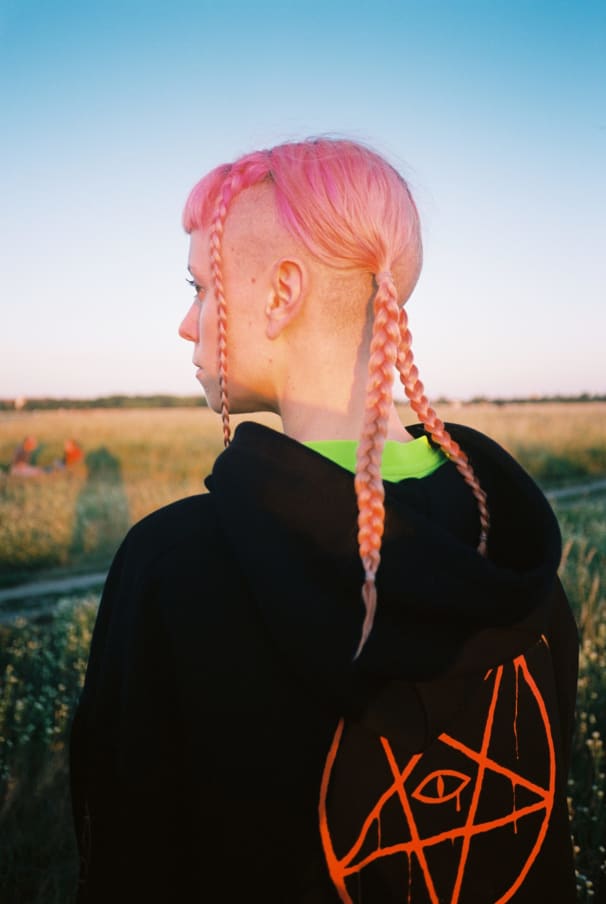
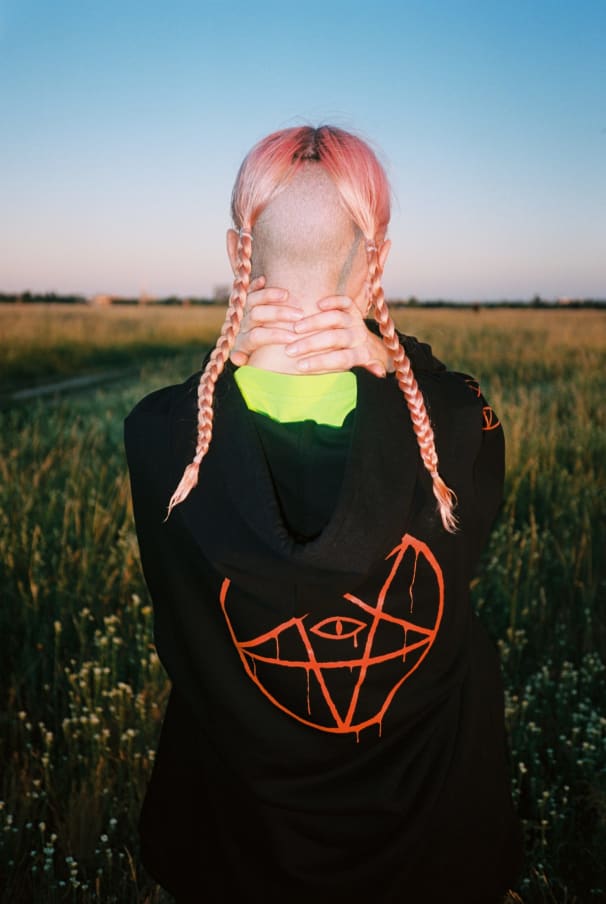
What sparked your interest in making music? I feel like there is kind of a punk spirit that’s reflected in your music.
I like that it reflects that, because that’s what I want to express as well. It’s a mix of a lot of different genres and feelings that I want to show. I was raised in a house with my grandfather, who was a jazz piano player and a music producer. He made music for commercials, for movies, for everything, and he had his studio in our house. So I was always hanging around there since I was a baby. I was surrounded by music forever. My mom and my dad met in a band. She sang. He played the guitar. So music was always there and it made it way easier for me when I decided that I wanted to also make music, because my parents knew that it was possible to make a living out of it because they had the example of my grandfather who supported our family that way.
I’ve always played the guitar. I sang, I started writing music when I was like 13. And then when I finished high school, I started studying electronic music production. I started a bunch of projects but in 2010 I started Catnapp. That was the best one, and it’s been 10 years.
You pull a lot of things from different genres. Were you always thinking in those terms or did it take a long time to build that approach?
I think it was always like that. I like a lot of things. I don’t like only one thing and I think that was always my approach. I wanted to mix everything I like together into one thing. Before I did Catnapp, I was maybe on the one hand making songs on the guitar and singing, and on the other hand I did this electronic project that was more like electro-techno—no vocals. Just dance music for clubs. When I created Catnapp, I was like hey, why don’t I merge both? Merge those two sides of me that I like—the singing part and the electronic music part—and also produce the kind of music that I love, like MIA mixing with The Prodigy.
How did you end up on Unorthodox? My mom was actually watching it and I caught the club scene that you’re in and watched it for a few minutes and didn’t even put it together, that it was you.
What surprises me the most about this whole thing is the amount of moms, my friends’ moms, that recognized me in the series. So many friends, even virtual friends, have been like, ‘My mom saw you in this series.’ I’ve never met your mom in my life. How does she know who I am? That was very funny. I think it was a coincidence. I believe because the husband or boyfriend of the director, Maria Schrader, went to Berghain one night and I was performing there. He saw my performance and he said, ‘Wow, we should include this in the club scene.’ And he showed it to Maria, and Maria liked it. I am not sure if they were actually actively looking for someone for that scene or it was just all coincidence. They reached out to me and told me a bit about the story and I said yes, and it was a very, very fun thing to do. It was 11 hours of recording and performing the same three songs over and over and over again in a club. Very hot, very sweaty, in the middle of summer. I really didn’t know that it would have such a big repercussion and that it would explode so much, especially because when the quarantine started everyone was at home and watched the series. In Argentina it was especially crazy. I’ve never had so much press in my life.
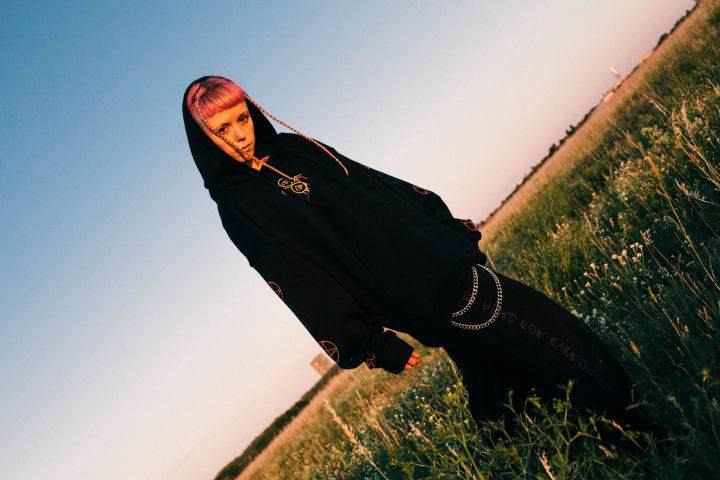
Your work feels so different from the themes of the show. Did you relate to any of the themes of it?
I didn’t know a lot about the series. I knew something. I knew that it was about a girl that was… This girl Este and her life, but I didn’t know that it was related to music as well. I didn’t know that she wanted to be a musician. I knew that she moved to Berlin, and I knew that it was her first time out [at a club] in the scene that I was going to be in, but I didn’t know a lot of other things. It doesn’t have a lot to do with my story but at the same time it does actually, because she escaped her reality to go look for a better life in something related to music in Berlin. That happened to me as well—not in such an extreme way, fortunately. She kind of discovered a better life and freedom here, like I did, and I felt very touched that I was participating in that exact moment that represented her discovering all of those feelings. The first time I heard music in a loud space, as I said before, was very meaningful for me as well. It was the first time she kissed someone with real love, and then made love with someone while my track is playing in the background. That scene made me cry. It was very emotional, and I felt like my music was used in such a nice way there. I was also very emotional about that because my music was never used as perfectly in any other thing before, so in that way I identified with it.
Now that there’s more eyes on you, do you find that it’s hard to stick to your own vision when you are thinking about how others will perceive it?
A bit. My main thing is to be true to myself. I’m never going to make something that I don’t believe in. I write songs because I need to express something and because I think that thing is going to be useful for someone else. But what’s really making it hard now, and this has also happened to me before, is that I have a really hard time with comparisons. In 2010 there was a huge wave of people comparing me to Yolandi from Die Antwoord just because of my hair, or because I sing in English. So in Argentina it was like, ‘Why do you sing in English? Do you want to be Yolandi Visser?’ And now I’m having it with Grimes. It’s really frustrating to put so much love and dedication into something that is mine and really honest and I just get this comment sometimes: ‘Oh, are you Grimes? Why are you copying Grimes?’ And it’s like, dude, you don’t have a clue what I’ve done to create this.
Is there anything else about the EP that people should know?
The album doesn’t only talk about self-destruction. I also included, because we were talking about my teenage days and stuff, I also included some teenage angst feelings that really go back to those times. If you listen to the lyrics of one song called “Vamp,” it’s like those teenage days never really left me. A lot of the lyrics that I write are written from that perspective—not from my grownup self, but from that teenager that was angsty.
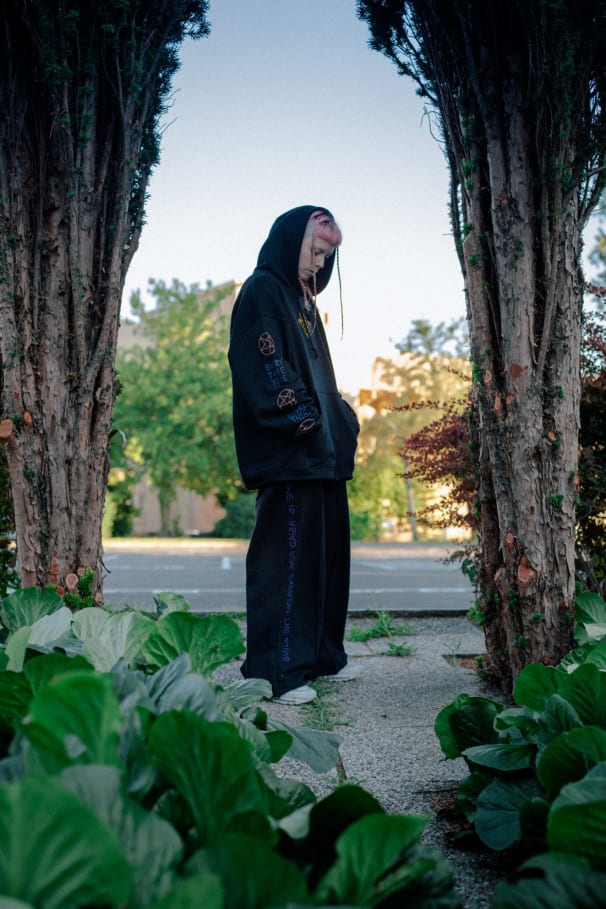
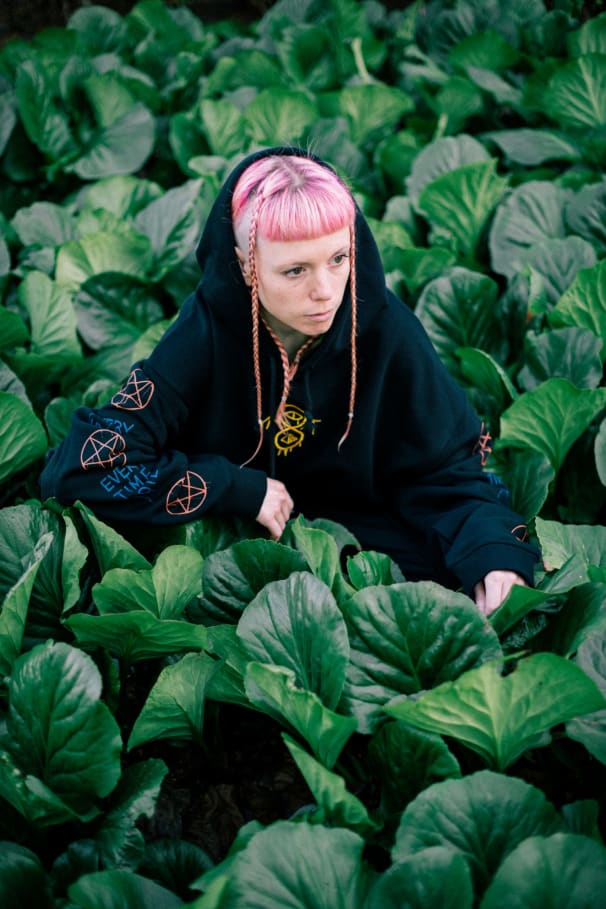
Do you think that you write from that perspective because it’s more relatable? As you get older your experiences get more precise, but do you think those teenage feelings might be a bit more universal?
Oh, no, not all. I feel the opposite. I still for example listen to bands that I did back then. I still listen to a lot of Limp Bizkit, The Offspring, Blink-182, Linkin Park. I never stopped listening to any these bands and all of my friends have. Everyone around me has, of course, and I’m very surprised by this. I would be like, ‘Why don’t you still listen to Linkin Park? You guys are so weird, you don’t listen to Linkin Park anymore.’ And then I realized, oh no, I’m like the only one that is actually still listening to this. So when I’m writing those lyrics, I feel like I’m taking a chance as well because I don’t think that a lot of people can relate to that, at least at my age. Maybe some of the other people can.
That’s interesting. Why do you think that you kind held on to that music?
I think that there are feelings that you get when you are younger that really mark you in a way, or music that you hear that really marks you also in another way. Those feelings are so strong that they didn’t leave me. I’m a very nostalgic person, so I think I hold on to the past a lot, just in my memories or things that influence me. I think also it’s just because that music is so good and full of emotion, even if others consider it simple. I can still relate to those lyrics.
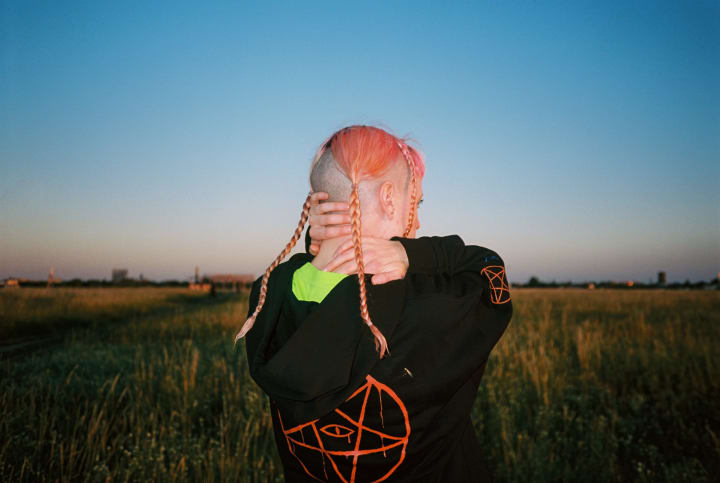
Published June 29, 2020. Words by Rachel Hahn, photos by Sylvie Weber.
